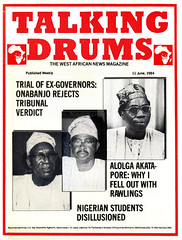What The Papers Say
The Currency Crisis
National Concord
Nigerians, it must be said, rose to the occasion admirably in the spirit of WAI. For 12 trying days, they stood patiently in queues that stretched for as far as the eye could see. They kept vigil in banks, sometimes, for days without changing their old notes. They endured hunger, heat and hassle. They forgoed sleep, lived through anxiety and uncertainty. If that was part of the sacrifice required of them to put the economy on course, they all seemed to say, they were only too pleased to offer it.
But 22 days have now passed since the currency change ended, and they are not any distance, it seems, near the end of their travails on the matter. There is a limit to which human beings endure hunger, starvation and other kinds of deprivations. Trade by barter is no more a feasible proposition in the highly monetized economy of 1984 Nigeria any more than herding city-dwellers into caves to live by hunting and food gathering.
Two things seem to have gone wrong which are now exacting unacceptably high prices from the populace. First, there must have been a culpable miscalculation by the Central Bank of Nigeria's treasurers of the amount of money in circulation prior to the exercise. Secondly, and as a corollary from the former, the CBN, egged on by a seemingly badly-briefed government, plunged into this exercise with grossly inadequate supply of the new notes. Again there is the unspoken but manifest disposition to utilise un orthodox currency control methods to fight inflation and kick down prices.
These fundamental errors have now taken a toll not only in terms of human suffering, they have also brought the economy to a standstill and caused as much damage as would take quite some time to repair.
The Central Bank's balance sheet as at last December 31, published in Federal Government's Official Gazette of March 8, has N5,299,288,823 as the amount of currency in circulation. No one would have quarrelled with the CBN's often-repeated intention to change about N3.5 billion if the Bank was, even remotely, seen to have substantial control over currency circulation. But the truth is that it did not have such control before the change and was, therefore, hardly in a position to state with any degree of accuracy the quantity of currency in illegal hands which the exercise was determined to cut off. Apparently, it also left little margin for error thereby compounding ignorance with self-conceit. If CBN's insistence that it must collect and eliminate all the old notes before opening the currency tap full blast is defensible, the Bank ought to have reckoned also with the facilities at its possession. For it is common knowledge that its incinerator and shredder cannot cope with billions in so short a space of time. But why didn't the Central Bank begin its currency-burning expedition in Badagry as early as May 8? Why the delay in printing the new notes locally and, why, despite all that delay, should defective notes be reported?
The many hurdles placed on the way of individuals with more than N5,000 deposits would not help the poor but it would hurt the rich. What kind of economics is that?
A great deal can be said for doing business by cheque. For one thing, it would discourage armed robbery marginally and promote prudent spending. But ours is yet an essentially cash economy for obvious reasons - not least being our high illiteracy rate and habits. And these phenomena cannot be changed overnight, no matter how hard we try to hammer it into the skulls of everyone.
Now, hundreds of thousands of workers on whom mil lions more depend, therefore, must necessarily be paid by cash. They are not being paid but are given pittances which cannot sustain them and their dependents even for a day. The result is that millions of man-hours are spent queuing up daily in banks, while corporate operations are paralysed.
The most that can be said of the much trumpeted impact of the currency change on prices is that any estimate is rather premature. The current euphoria is therefore as baseless as it is illusory. The iron law of supply and price cannot and has never been subordinate to such artificiality and financial antics like currency hoarding.
If the situation in the cities is alarming, the fate of the rural folk is out and out miserable. There, the question of banks does not even arise. Whole families have had nothing to live on for weeks, having deposited the little they had with the local government administrators who seem determined to take their time to refund deposits. It is no wonder, therefore, that they have had to resort to trade by barter.
The Federal Government should for goodness sake view the current situation as a national emergency and take appropriate measures to relieve the citizenry of the extremely strenuous predicament. While hurrying up the local mint, it should also remove some of the impediments for normal business practice. No large scale organisation can do meaningful business with the kind of money being given at the banks. They also have the obligation to pay most of their staff by cash and should be given exemption in that respect. To permit the present currency crisis to continue would surely diminish the enormous gains the country had hoped for.
FOR OPINIONS THAT CHALLENGE YOUR BELIEFS
WHERE ELSE BUT IN TALKING DRUMS
